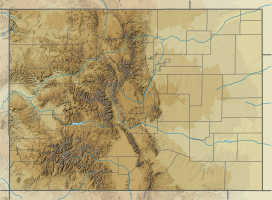South Bald Mountain
Appearance
| South Bald Mountain | |
|---|---|
| Highest point | |
| Elevation | 11,009 ft (3,356 m)[2][3] |
| Prominence | 1,863 ft (568 m)[4] |
| Isolation | 8.54 mi (13.74 km)[4] |
| Listing | Colorado prominent summits Colorado range high points |
| Coordinates | 40°45′10″N 105°41′46″W / 40.7526786°N 105.6960807°W[2] |
| Geography | |
| Location | Larimer County, Colorado, U.S.[1] |
| Parent range | Highest summit of the Laramie Mountains[4] |
| Topo map(s) | USGS 7.5' topographic map South Bald Mountain, Colorado[2] |
South Bald Mountain is the highest summit of the Laramie Mountains in the Rocky Mountains of North America. The summit in Roosevelt National Forest southwest of Red Feather Lakes is the highest of five peaks forming Bald Mountain.[2]
Climate
[edit]There is no weather station at the summit of South Bald Mountain, but this climate table contains interpolated data for an area around the summit.
| Climate data for South Bald Mountain 40.7757 N, 105.7363 W, Elevation: 10,791 ft (3,289 m) (1991–2020 normals) | |||||||||||||
|---|---|---|---|---|---|---|---|---|---|---|---|---|---|
| Month | Jan | Feb | Mar | Apr | May | Jun | Jul | Aug | Sep | Oct | Nov | Dec | Year |
| Mean daily maximum °F (°C) | 26.1 (−3.3) |
26.7 (−2.9) |
33.3 (0.7) |
39.0 (3.9) |
49.0 (9.4) |
60.3 (15.7) |
66.9 (19.4) |
64.6 (18.1) |
57.2 (14.0) |
44.4 (6.9) |
33.0 (0.6) |
25.9 (−3.4) |
43.9 (6.6) |
| Daily mean °F (°C) | 16.1 (−8.8) |
16.1 (−8.8) |
22.0 (−5.6) |
27.3 (−2.6) |
36.6 (2.6) |
47.0 (8.3) |
53.5 (11.9) |
51.8 (11.0) |
44.8 (7.1) |
33.5 (0.8) |
23.3 (−4.8) |
16.1 (−8.8) |
32.3 (0.2) |
| Mean daily minimum °F (°C) | 6.1 (−14.4) |
5.4 (−14.8) |
10.6 (−11.9) |
15.6 (−9.1) |
24.2 (−4.3) |
33.7 (0.9) |
40.0 (4.4) |
38.9 (3.8) |
32.4 (0.2) |
22.6 (−5.2) |
13.5 (−10.3) |
6.4 (−14.2) |
20.8 (−6.2) |
| Average precipitation inches (mm) | 3.03 (77) |
3.15 (80) |
3.74 (95) |
4.92 (125) |
3.69 (94) |
1.70 (43) |
1.77 (45) |
1.68 (43) |
1.93 (49) |
2.85 (72) |
3.11 (79) |
2.87 (73) |
34.44 (875) |
| Source: PRISM Climate Group[5] | |||||||||||||
Deadman Hill (Colorado) is a small peak near South Bald Mountain. Deadman Hill has a subalpine climate (Köppen Dfc).
| Climate data for Deadman Hill, Colorado, 1991–2020 normals: 10220ft (3115m) | |||||||||||||
|---|---|---|---|---|---|---|---|---|---|---|---|---|---|
| Month | Jan | Feb | Mar | Apr | May | Jun | Jul | Aug | Sep | Oct | Nov | Dec | Year |
| Mean daily maximum °F (°C) | 25.6 (−3.6) |
26.8 (−2.9) |
34.9 (1.6) |
41.9 (5.5) |
52.1 (11.2) |
61.4 (16.3) |
68.0 (20.0) |
65.7 (18.7) |
57.4 (14.1) |
44.3 (6.8) |
32.5 (0.3) |
25.6 (−3.6) |
44.7 (7.0) |
| Daily mean °F (°C) | 16.5 (−8.6) |
17.1 (−8.3) |
24.0 (−4.4) |
30.0 (−1.1) |
39.4 (4.1) |
47.9 (8.8) |
54.2 (12.3) |
52.5 (11.4) |
45.2 (7.3) |
34.0 (1.1) |
23.3 (−4.8) |
16.4 (−8.7) |
33.4 (0.8) |
| Mean daily minimum °F (°C) | 7.4 (−13.7) |
7.5 (−13.6) |
13.1 (−10.5) |
18.1 (−7.7) |
26.8 (−2.9) |
34.4 (1.3) |
40.3 (4.6) |
39.2 (4.0) |
33.0 (0.6) |
23.7 (−4.6) |
14.3 (−9.8) |
7.2 (−13.8) |
22.1 (−5.5) |
| Average precipitation inches (mm) | 2.68 (68) |
2.79 (71) |
3.42 (87) |
4.58 (116) |
3.34 (85) |
1.65 (42) |
1.50 (38) |
1.51 (38) |
1.87 (47) |
2.67 (68) |
2.69 (68) |
2.46 (62) |
31.16 (790) |
| Source 1: XMACIS2[6] | |||||||||||||
| Source 2: NOAA (Precipitation)[7] | |||||||||||||
Historical names
[edit]
- Bald Mountain
- South Bald Mountain [1]
See also
[edit]- List of Colorado mountain ranges
- List of Colorado mountain summits
- List of Colorado county high points
References
[edit]- ^ a b "South Bald Mountain". Geographic Names Information System. United States Geological Survey, United States Department of the Interior. Retrieved November 13, 2014.
- ^ a b c d "SOUTH BALD". NGS Data Sheet. National Geodetic Survey, National Oceanic and Atmospheric Administration, United States Department of Commerce. Retrieved October 22, 2014. Note: The summit of South Bald Mountain is +0.61 m (+2.0 ft) higher than NGS station SOUTH BALD.
- ^ The elevation of South Bald Mountain includes an adjustment of +1.424 m (+4.67 ft) from NGVD 29 to NAVD 88.
- ^ a b c "South Bald Mountain, Colorado". Peakbagger.com. Retrieved October 22, 2014.
- ^ "PRISM Climate Group, Oregon State University". PRISM Climate Group, Oregon State University. Retrieved October 10, 2023.
To find the table data on the PRISM website, start by clicking Coordinates (under Location); copy Latitude and Longitude figures from top of table; click Zoom to location; click Precipitation, Minimum temp, Mean temp, Maximum temp; click 30-year normals, 1991-2020; click 800m; click Retrieve Time Series button.
- ^ "xmACIS2". National Oceanic and Atmospheric Administration. Retrieved October 10, 2023.
- ^ "Deadman Hill, Colorado 1991-2020 Monthly Normals". Retrieved October 10, 2023.

